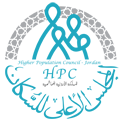

The Higher Population Council launched the results of the study "The intersection between mental health and maternal health around childbirth for Married Syrian refugee women under the age of 18", during a meeting held on Wednesday with the participation of the relevant national authorities.
The study, which was prepared by the Higher Population Council in cooperation with the University of Jordan, the University of Edinburgh-Scotland and the University of the west of Scotland, and with the support of the Arab Council for Social Sciences within the program "health and livelihoods in the Arab region: well - being, fragility and conflict" in its first session (2020-2022) funded by the Swedish International Development Cooperation Agency (SIDA), aimed to understand the views of Syrian adolescents and mothers regarding their experiences with child marriage in the context of conflict and displacement, and explore the motives that increase the vulnerability of young women married early to poor sexual and reproductive health and violence based on the social type.
The secretary-general of the Higher Population Council, Dr. Issa Al-masarwah, said that the study was conducted within two stages, the first was to hold focused discussion groups with the participation of relevant stakeholders, and the second stage was to use a qualitative survey approach to reflect the internal voices of Syrian refugee women who were subjected to marriage before the age of 18.
The results of the study showed that stakeholders expressed multiple negative attitudes towards child marriage, noting that child marriage is a form of gender-based violence that can lead to harmful "physical, social and psychological" consequences.
The results also showed, through a literature review, that child marriage among Syrian women as refugees in Jordan can be attributed to ideological, economic, legal, security and personal factors, such as (protection of the girl's honor, economic difficulties, lack of law, security concerns, family disintegration, transformation in social networks) that are closely related to the Syrian conflict as well as the refugee crisis that followed.
Through interviews with Syrian refugee women who have been subjected to child marriage, it emerged that the main factors leading to child marriage are the pressure of family members on the girl to marry before the age of 18, the girls ' escape from the tragedies they have experienced, and the lack of economic opportunities. for them, marrying at a younger age will improve their living conditions and move from the cramped camp environment through a legal path.
In general, the study revealed that child marriage has multiple harmful consequences. women involved in child marriage are usually subjected to various forms of physical abuse, violations occur in front of children, other family members and neighbors, which leaves women in great shame, in addition to the prevalence of domestic sexual violence, where the sexual experiences of the interviewees were painful and coercive, and the interviewees indicated that they were subjected to reproductive coercion on a large scale.







